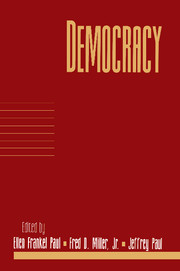Book contents
- Frontmatter
- Contents
- Introduction
- Acknowledgments
- Contributors
- The Very Idea of Popular Sovereignty: “We the People” Reconsidered
- Quasi-Rights: Participatory Citizenship and Negative Liberties in Democratic Athens
- Is There a Duty to Vote?
- Postmodern Liberalism and the Expressive Function of Law
- Democratic Epistemology and Accountability
- Political Quality
- Why Deliberative Democracy Is Different
- The Institutions of Deliberative Democracy
- Democracy as a Telos
- Radical Democracy, Personal Freedom, and the Transformative Potential of Politics
- Democracy and Value Pluralism
- The Problem of Russian Democracy: Can Russia Rise Again?
- Index
The Institutions of Deliberative Democracy
Published online by Cambridge University Press: 03 May 2010
- Frontmatter
- Contents
- Introduction
- Acknowledgments
- Contributors
- The Very Idea of Popular Sovereignty: “We the People” Reconsidered
- Quasi-Rights: Participatory Citizenship and Negative Liberties in Democratic Athens
- Is There a Duty to Vote?
- Postmodern Liberalism and the Expressive Function of Law
- Democratic Epistemology and Accountability
- Political Quality
- Why Deliberative Democracy Is Different
- The Institutions of Deliberative Democracy
- Democracy as a Telos
- Radical Democracy, Personal Freedom, and the Transformative Potential of Politics
- Democracy and Value Pluralism
- The Problem of Russian Democracy: Can Russia Rise Again?
- Index
Summary
INTRODUCTION
A theory of democratic institutions should provide us with a coherent combination of definition and justification. It should explain how it defines democratic institutions and also how they will or should function; but it also should explain why democracy, so understood, is desirable. We are all familiar with stories about the fiscal excesses to which democracies are prone, stories about the ignorance of voters, and stories about the venality of legislators. Some of us may also be suspicious of concepts such as “consent” or “the will of the people” associated with traditional arguments for democracy. Against this background, the current interest in deliberative democracy seems promising. This conception of democracy does not rely, for example, on the idea of rational and knowledgeable voters satisfying preferences they have independent of the political process. Nor does it rely on any notion of an independent popular will. Instead, it offers a picture of the democratic process as one in which men and women engage in constructive discussion, seeking a principled resolution of their differences and developing, over time, a conception of the terms on which they will live with one another.
As promising as this idea may seem, however, I believe that it fails to deliver some of what proponents of democracy might hope for. To take one example, on which I will focus a good deal of attention, many democrats have stressed the distinctness and intrinsic attractiveness of the democratic vision, portraying it as fundamentally at odds with a liberalism that seems to stress individual rights against the state, sharply limiting the power of even democratically elected governments.
- Type
- Chapter
- Information
- Democracy , pp. 181 - 202Publisher: Cambridge University PressPrint publication year: 2000



